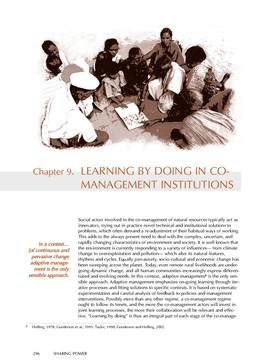Chapter 9. LEARNING BY DOING IN CO- MANAGEMENT INSTITUTIONS
Document begins: Chapter 9. LEARNING BY DOING IN CO- MANAGEMENT INSTITUTIONS Social actors involved in the co-management of natural resources typically act as innovators, trying out in practice novel technical and institutional solutions to problems, which often demand a re-adjustment of their habitual ways of working. This adds to the always present need to deal with the complex, uncertain, and rapidly changing characteristics of environment and society. It is well known that In aa ccontext. the environment is currently responding to a variety of influences-- from climate [of ccontinuous aand change to overexploitation and pollution-- which alter its natural features, pervasive cchange rhythms and cycles. Equally pervasively, socio-cultural and economic change has adaptive m manage- been sweeping across the planet. Today, even remote rural livelihoods are under- ment iis tthe o only going dynamic change, and all human communities increasingly express differen- sensible aapproach. tiated and evolving needs. In this context, adaptive management1 is the only sen- sible approach. Adaptive management emphasises on-going learning through iter- ative processes and fitting solutions to specific contexts. It is based on systematic experimentation and careful analysis of feedback to policies and management interventions. Possibly more than any other regime, a co-management regime ought ...
Cite this publication
Available at https://www.iied.org/g01086
